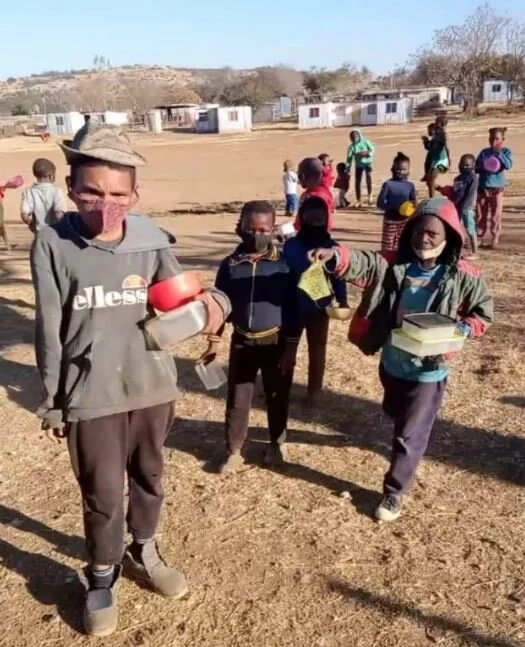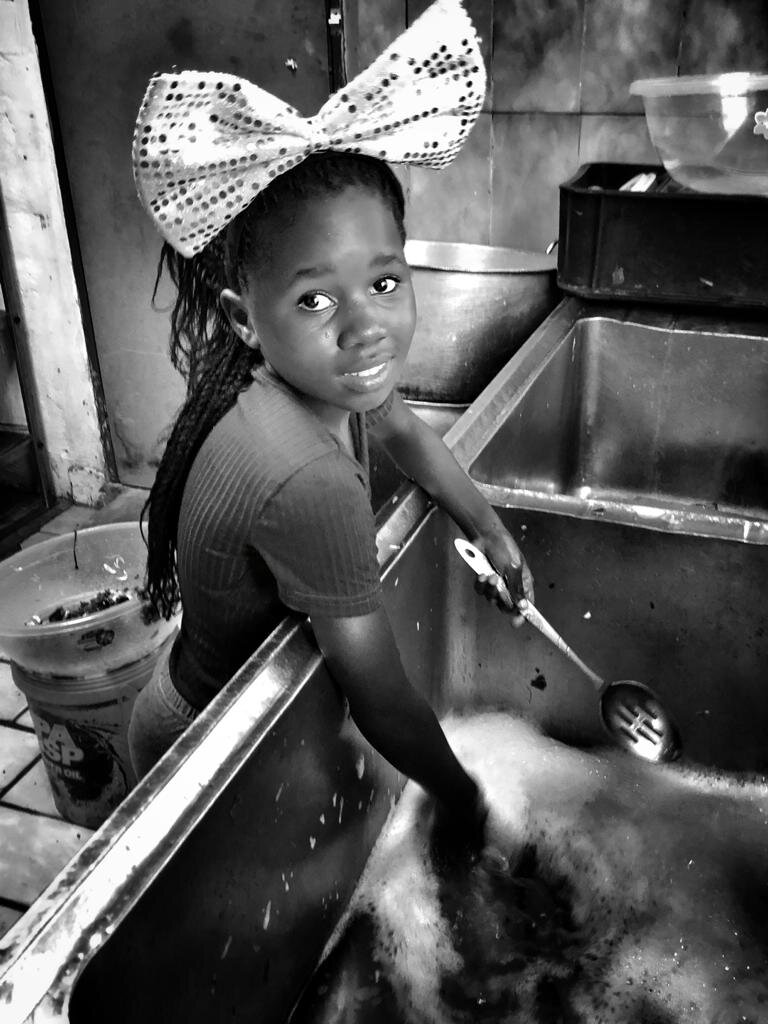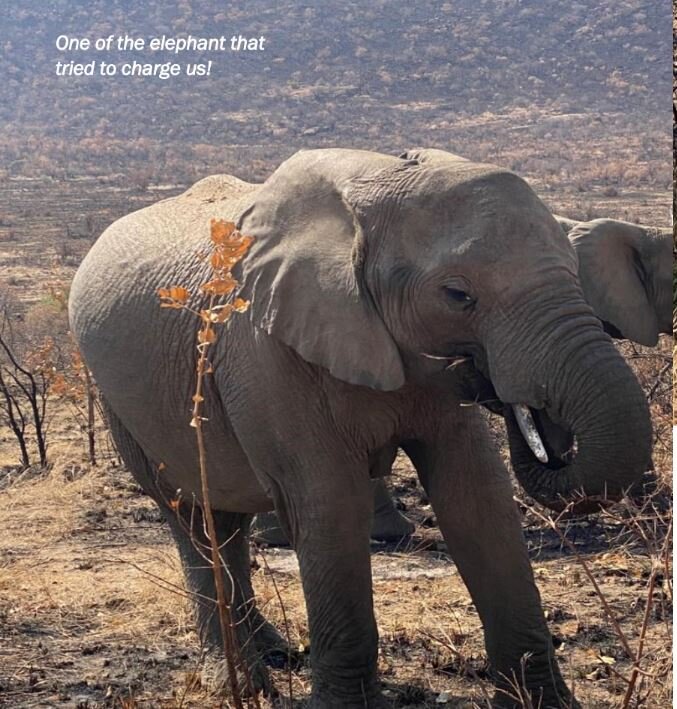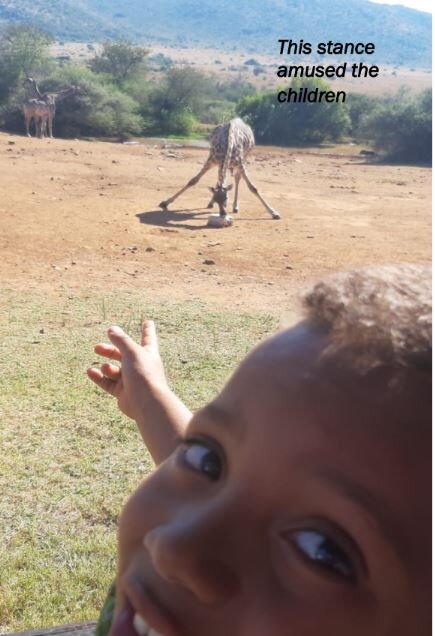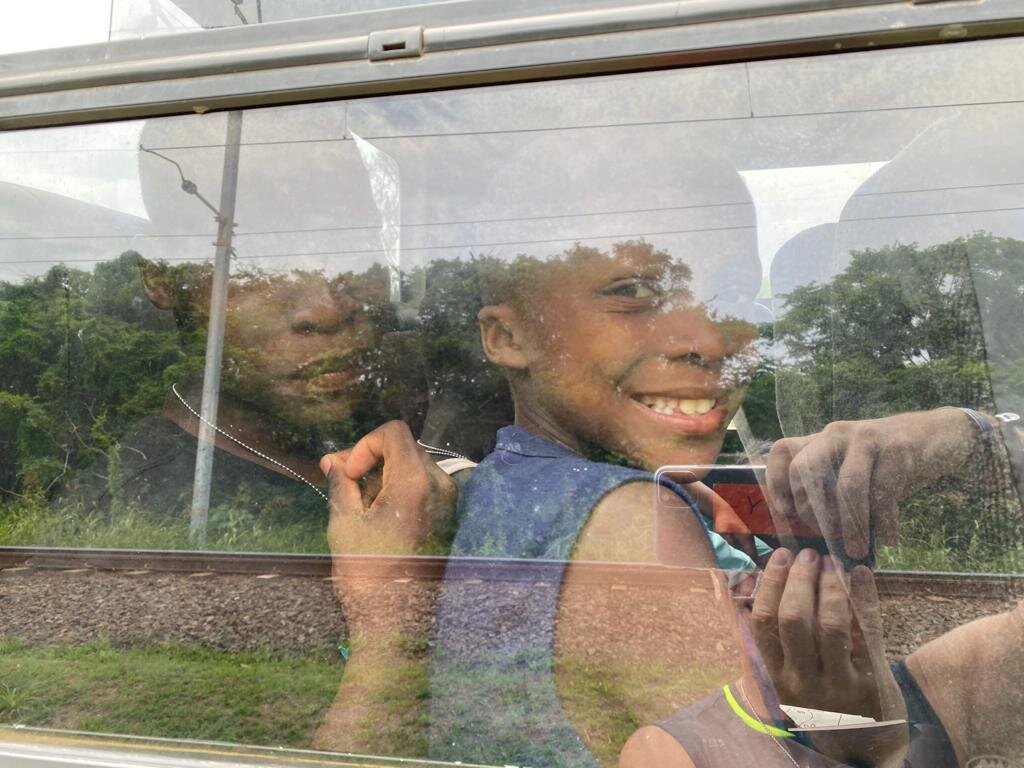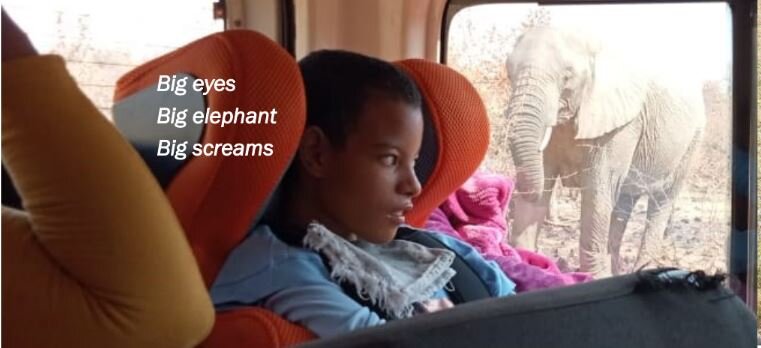2021 - Spring Newsletter
Your donations at work
Children queue for a meal
Gratitude to the selfless support of donors like you towards BCDT’s Soup Kitchen. These donations have allowed us to increase the number of meals provided for our village’s neediest residents. We’ve also made these meals more nutritious and flavorful, and added meat two to three times a week. Additional cooking gas was also purchased.
Due to the chilly winter, we also spent more on electricity. Six dogs were saved from biliary, and additional food was organized for the outreach animal feeding scheme. The transport department required several car parts for repairs including a diesel pump for the Iveco. Leigh’s maintenance department could repair the salt chlorinators for the pool, repairing roofs, battery for the solar panels, fencing, leaking geysers and pipes, creche swings and equipment, windows, and door handles.
We continue to use our Iveco bus, ancient and rickety, yet still faithfully reliable. Your funds keep this old war-horse running, providing a valuable lifeline for the community’s ambulance services, game drives, and for transporting passengers, groceries, coffins, and general supplies. This month, we divided the kids into five groups of sixteen, and drove them into town. They were delighted with this shopping excursion, where they could each choose their own pair of shoes, two pairs of socks and underwear, and a bra for the girls. In addition, the local burger outlet, Steers, has a food special called Wacky Wednesday that includes two burgers and a coke, which each child could buy. The excitement was frenzied as children ran up and down to town showing off their treasured purchases.
Kids show off their cherished purchases
August winds Blow in Women’s Month
This newsletter is dedicated to the amazing women administrating Botshibelo and the sisters who support us from all over the world. May all the world’s women and girls have the freedom to live out their dreams and passions in a safe environment.
Botshibelo management consists of mostly women. They dedicate their work tirelessly to the wellbeing of all South Africans regardless of gender, age, or background.
Sadly, our beautiful country is not safe for any women, regardless of age. Gender based violence [GBV] is the new normal. South Africa is faced with continual gender-based abuse. It breeds in poverty, leaving family members vulnerable. Botshibelo has lowered its GBV to under 1% due to continual education and intervention. Each incident should receive diverse, and possibly ongoing, interventions from therapists. We are simply not staffed for such support levels, and management can provide only a portion of the support that is necessary, which sometimes makes our assistance difficult to access for those who need it most.
The trauma we have witnessed festers, and often explodes, with violent and tragic outcomes when a tipping point is reached.The ‘good’ men in the village are left stunned and embarrassed at the poor behavior of their brothers.Many men choose not to intervene earlier, because such interventions may be viewed as an encroachment of privacy.
Many problems stemming from mental health issues are left to untrained individuals, or people better trained for other disciplines, such as paramedics, police officers, church leaders and community leaders. To put this scourge into perspective, only a small number of citizens are perpetrators, while the majority continue building the country as best they can.
Fortunately, we have had counselling training in Botshibelo, so our intervention for any trauma is immediate and unapologetic. The cases we deal with in the village have taught us that rape is about power, not sex. When one person is raped, it is an assault against the family, and the community as a whole. It leaves sweeping psychological, mental, and economic destruction in its wake. The enormous stigma, and the mutinous silence of the family or caretakers, presents a minefield of uncertain outcomes. Too often, when the perpetrator is a primary economic provider, the case is quietly dropped. The case of a young village boy who was abused during the holidays remains unresolved because the perpetrator is a ‘loved one.’ BCDT management’s approach is to support the family, adhere to their wishes and assist if there is a medical issue, such as HIV or STI infections.
BCDT have introduced several successful measures to ensure safety for the children. One is by dividing the village into pods, each one administered by managers and youth. The village entrance remains locked, which prevents unknown cars entering. High visibility and 24-hour intervention has reduced the number of abuses. Pod monitoring and monthly village meetings are part of the security strategy. Sadly, all strategies fail at the end of month, government grant days, and Fridays when wages are received. With large groups consuming excessive levels of alcohol and drugs, fights, abuse, violence and stabbings are the norm. Education and constant intervention by the BCDT management and the community’s sober residents is provided daily. Yet we watch the new generation apprehensively, as some begin to mimic their families’ cycles of violence.
Many of BCDT’s management have themselves experienced various forms of abuse before coming to BCDT. This includes incarcerated parents, siblings under the age of ten surviving on handouts, child prostitution, being raped and ‘lent’ to family members, or used as child slaves. Betrayal and loss are a common denominator in their collective childhood experiences and memories. With love, attention, hope and protection they have begun to heal. However, the childhood innocence and essence lost from the betrayal of adults is difficult to redeem. The pain, sadness and emptiness remain a constant presence around them. BCDT’s aim is to prevent traumatized youth and children from suicide. We are pleased to report there has not been a single suicide among the children and youth of the village in the past thirty years.
Our support of disillusioned youth is made more urgent, but more difficult in the face of an uncaring, or occasionally inept government. When the local hospital was behind on Covid-19 testing, a critical procedure was postponed, and Mapule lost her baby. A six-year-old girl was excited when we assisted in healing a huge abscess on her foot, after her alcoholic mother said she was too busy to take her to the clinic. The pregnancy rate among teenagers has risen in BCDT during Covid-19 lockdown. Nationally, 23,000 teenagers fell pregnant this past year, with 2,976 teens giving birth before their 15th birthday.
We mention these painful issues so that you, our supporters, are aware of the social aspects that BCDT management face daily and how important your ongoing support is.
UBUNTU: In a country with a tragic history of apartheid, and violence and abuse toward women, we continue to be inspired by the resilient power of women to prosper and build within BCTD. The most durable aspect of our community is the undying, African spirit of resilience and belief in community and sharing, sometimes known as Ubuntu. Ubuntu is a Nguni Bantu term meaning "humanity". It is sometimes translated as "I am because we are". Whenever hopelessness and betrayal surround us, ‘Ubuntu,’ the essence of Africa permeates us, that is, qualities of essential human virtues, compassion, and humanity and ‘you,’ our supporters are BCDT’s Ubuntu.
Update on Botshibelo and South Africa
Winter, Looting, Corruption, Feeding-Scheme, Covid-19, and Lessons learnt in the Land of Botshibelo
Botshibelo is starkly beautiful in August. The August winds accelerate, causing dusty conditions, and forcing villagers to add rocks to hold down the loose zinc sheets on the roofs of shacks. The constant banging of zinc sheets adds to the cacophony of village sounds. Old buckets full of soaking laundry festoon front steps, awaiting the return of children from their play or school.
During July, massive riots and social unrest rocked South Africa. The violence marked the worst civil unrest in South Africa since the end of minority rule in 1994, and left 342 people dead, and thousands of businesses looted or destroyed.
The immediate trigger for the unrest was the jailing of Jacob Zuma, the former South African president now implicated in a sprawling inquiry into allegations of bribery and corruption under his tenure. Zuma was held in contempt of court and sentenced to 15 months in prison for his repeated refusal to participate in the trial’s proceedings.
Government officials labeled what followed as an “insurrection,” with protests led by Zuma’s supporters spiraling into full-blown riots in townships in Gauteng and KwaZulu-Natal provinces (home to the major urban centers of Johannesburg and Durban, respectively). Major highways were blocked, trucks burned, shops and even schools and medical offices ransacked. The army was deployed, but the upheaval still wreaked more than $1 billion in damage and led to scores being killed amid stampedes and clashes with police and vigilantes.
South Africa is the global poster child of economic inequality, where deep poverty sits in the shadow of astronomical wealth. The post-apartheid republic is hobbled by age-old problems of corruption, state failure, tribalism and cronyism. The recent riots reflect, in many aspects, a uniquely South African tragedy. What happened in South Africa is what happens when the gross inequality that shapes a whole society boils over. And it’s also what happens when a major political faction and influential leader prioritize their own interests over the integrity of their country’s democracy.
Business News 24 predicts that South Africa will experience more frequent bouts of violent protests unless the government fast tracks growth enhancing structural reforms. The violence during apartheid was against a legalised enemy, overt and visible in its draconian rule. The new enemy that hinders socio-economic equity is invisible and more difficult to combat because it is in the fabric of government. Democratic voting has improved lives for millions. But the trillions of dollars looted through corruption have resulted in critical government institutions starved and unable to deliver basic services.
While our government counts the cost of the looting, Botshibelo residents count and live the cost of poverty every day. At BCDT, basic government assistance for citizens living in poverty has never materialized. Many villagers living in BCDT have been on a waiting list for an RDP [low-cost single room house] for over 20 years. Skills training, where it exists at all, remain focused on low-level labour, not in higher (and more lucrative) trade skills such as electrical or plumbing.
The governments' inept and corrupt approach to assisting youth living in poverty has led to protesting becoming the new tool for the ‘powerless.’ The youth in the village and country see protesting as an alternative leverage to gain socio-economic equity. This is problematical for the security of the country, yet the systemic failure of our young democratic country leaves few options. The social fabric of South Africa, which should ensure inclusive sustainable prosperity for everyone, has dissolved Africa’s gift of ‘Ubuntu’ into a form of complacency and greed. This was amply demonstrated recently, after an accident happened outside Botshibelo’s gates, and the management and police had to act quickly to prevent immediate stripping and looting of the victim’s car and belongings. This tragic scene is replicated far too often elsewhere in the country. Yes, it is inconceivable. But with continual news reporting corruption of the state's resources at an industrial scale, where are the role models?
Mr. Kganyago, the governor of the Reserve Bank reports that unemployment has risen to a new historical high, due to covid-19 economic fallout. He stressed that the economy already had its own “comorbidities” prior to Covid-19.
The government’s plea that citizens must accept painful economic trade-offs is difficult to justify for the Botshibelo youth, who have never enjoyed decent employment since they left school, and survive on grants and piece-meal work, a blatant betrayal. The fact is that there is no meat left on this carcass for painful economic trade-offs. The looting began with Zuma's jailing, but reveals a deeper schism that warns of a country siting on a powder keg. The fuse of the powder keg is not former president Zuma going to jail. It is hunger. Here at Botshibelo, we have witnessed how adults’ hunger caused one level of discontent and anger. But parents watching their children go hungry fuels a far deeper, more intense rage. “What happened to Madiba’s dream?” His grandson, Mandla penned in an open letter to his grandfather, ‘the corruption of the apartheid regime that you so vehemently decried has now insipidly entered our ranks and the threat of factionalism looms large.’
Covid-19 Stress Release
Nicole budgeted money to take a group of children and BCDT managers to a nearby game park. It is both affordable and a favourite outing from the village. Since the third wave, the number of physical fights and general issues with the youth have increased. The ongoing lockdowns, scary stories, and family problems with Covid-19, have badly disrupted daily lives. A peaceful game drive seemed the perfect antidote. It was wonderful - until a rowdy herd of elephants tried to stampede the car! The fear, hiding behind seats, and cries of ‘we are all going to die,’ were soon over, followed by a fun picnic and pleasant drive home. It was a memorable event and a perfect release of Covid-19 tension. The Takeaway: every situation has its own problems. Even so we are hopeful that BCDT will receive donations towards a camping trip to the sea in November.
Tshepo, a 17-year-old boy living in the village, broke home lockdown, got involved in a fight with other youth, and acquired Covid-19. He was extremely ill. We nursed him but didn’t know his diagnosis. Miraculously, we avoided becoming ill ourselves. Long story short he went to hospital for a week, a nurse phoned Nicole to complain that he kept walking around the hospital and would not remain in his ward. Subsequently his Covid-19 test returned positive, eventually he was moved to the Covid-19 ward. Nobody phoned to inform us, fortunately someone has a contact in the hospital who checked his chart and confirmed his positive Covid-19 status. A BCDT manager phoned the hospital; only then did the nurse confirm his status and tell us to inform the family to quarantine. Not exactly a perfect tracking systeml!
Lessons Learnt
The most poignant lesson taught is from a child. Alex, a 15-year-old took a homeless man, Macondo under his wing. Alex found money to pay him to plant his vegetables. Macondo had been moving from shack to shack, often sleeping in the grass. The managers attempted to question him about his background, but he remained silent. Alex discovered that he had lived an extremely traumatic life. As a child, his mother had abandoned him. At the age of eight he arrived home to find his father stabbed; he sat with him until he passed away. After his father’s death he had no one to care for him, and moved from home to home. He dropped out of school and became a manual worker, surviving on the farms during apartheid. He crossed the law and spent years in jail. Alex shared Macondo’s story with the BCDT management, who decided to allocate him a property to build his own home. Tragically, a taxi hit him on Saturday night, killing him instantly. A witness at the accident informed Alex by phone, the insensitivity of telling a young child that his friend was dead lost on him. Alex was heartbroken and sobbed bitterly. Especially when Macondo’s dog was also killed on the road while looking for him.
The lesson was everyone has a story; before judging them, give people the space and time to tell it. Don’t allow busy schedules to prevent compassion and ‘seeing’ other people. Alex met with Macondo’s friends, who asked Alex to assist them to bury him in the village cemetery. R4000 still owed for the funeral, trying to borrow. However, there is no greater gratification than observing the new generation picking up the baton, in the long struggle towards equity and inclusion.
In conclusion, BCDT had painful lows and new highs but remain dedicated to our path of achieving some respite for people living in poverty. The appreciation and celebration of our love for each other and our village enables us to continue our work. The feeding scheme continues unabated and has become a new normal for the village children and adults. Even when the food is late the queue of children waits patiently with their bowls for their two definite meals of the day. The family-based outreach campus in the village is growing and has proven to be successful and appreciated by impoverished parents. The next newsletter will cover this topic and some of the personal stories of the family-based outreach. We hope that you and your families remain healthy and safe. Love and respect to all from everyone at BCDT.


